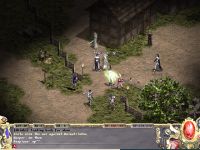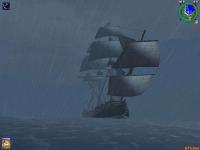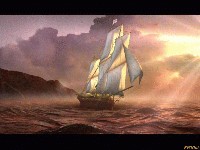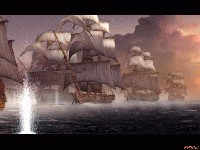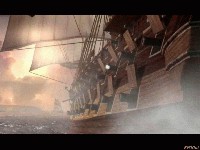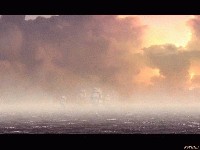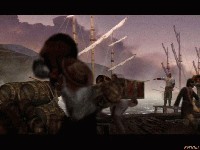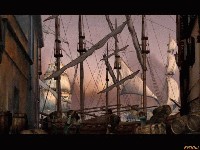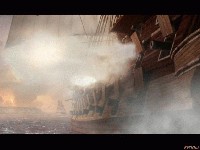|
|
|
Main News Forums Games Games Database Top 100 Release List Support Files Features Reviews Previews Interviews Editorials Diaries Misc Download Gallery Music Screenshots Videos Miscellaneous Staff Members Privacy Statement |
Pirates of the Caribbean Review
Let's Get This Out Of The Way Before we really get into it, a little history is in order: several years ago, an interesting, innovative, and modestly successful naval/action/RPG game called Sea Dogs was released - developed by a Russian studio called Akella, and distributed by Bethesda. As with many modestly successful (or more so) video games, a sequel was greenlighted, and Akella got to work. (Note: From here on out, I'm surmising based on fact.) At some point late in development, someone from Disney walked in the door with a proposition: rename the game Pirates of the Caribbean to tie in with an upcoming feature film, add some content to help tie the game to the film, and… have it out by the time the film is released. This would leave Akella with not enough time to finish the game properly, and force them to spend most of that time producing the new content necessary for the film tie-in, rather than implementing the remainder of features the game needed to really be playable. The point of the history lesson is to explain my main problem with Pirates of the Caribbean - wasted potential. The game as a whole wouldn't be perfect even if they had finished it to their liking, but I'll wager that it would be a whole lot better. I'll detail the litany of interface, documentation, and gameplay offenses the game will throw at you, because to start this game unprepared is to hurl your keyboard and mouse in frustration, but I'll also add a caveat: there is a good game lurking inside these flaws. Your enjoyment of the game will depend largely on how many problems you're willing to overlook, how good your imagination is, and whether you believe persistence is its own reward.
Hitting the High Seas (and a few islands) Pirates of the Caribbean, like Sea Dogs before it, is an odd hybrid of tactical ship combat, first (or third) person role-playing, and action. Half of the game occurs on land, where you control captain Nathanial Hawk. There are no character creation options to start - most character development occurs as you gain experience and level up, and a large portion of Hawk's skills relate to how your ship performs at sea. You can move relatively freely when on land, talking to and/or fighting with a multitude of NPC's. Most of these encounters are meaningless, providing town locations but not much else, although certain conversations will yield side quests of the 'protect a ship / take this from here to there' variety. The remainder of the game happens at sea, where you can sail from island to island, fight pirates (or be one yourself), transport goods (or contraband), and pretty much do what you want. There is a short tutorial of sorts, and then you're in the world and on your own.
The Bad Parts The gameplay problems range from small oversights to crippling blunders. The first insult: the map - both overland and at sea. I've read several reviews that say there is no way to see where you're sailing on the world map. That, in fact, is not the case. However, you have to go to Bethesda's website and look in the support section to see that if you hit the Tab key, you can scroll over the world map. And though this is a solution, like most solutions in POTC, there is a flaw - time keeps running while you're looking at the map. So days will pass while you're trying to figure out which direction to sail, your crew demands money every month, so time spent looking at the map is money wasted. When on land, the solution is simpler - there is no map, or compass to point your way. There are occasional signposts pointing toward the general direction of port towns, but if you land your ship on a deserted beach somewhere, you'd better remember how to get back to it. The worst part of this is that they could have just included a paper map, and had a compass on the land interface - not perfect, but problem basically solved.
As has been noted in numerous other reviews, the control setup and general interface is atrocious, even when reconfigured. When controlling your character on land, you can't strafe, you can only move forward and back; the mouse controls sideways movement. This isn't a big problem until you need to fight, at which point the lack of control is more evident (usually as you're dying). Nearly every action takes three keystrokes, which is inconvenient but not debilitating, but it's rather annoying when you need to talk to an NPC that won't stop walking, and you can't get to the talk command fast enough. There is a default command key, but there are very few commands that actually appear as defaults - for example, talking to a merchant is not a default command. Opening doors is about all it's good for. There are no existing or assignable hotkeys - not even for such useful commands such as reloading cannons with different types of shot while in combat at sea. To do that, as with everything else, you'll need to open your command menu with one button, arrow over to what you want to do, and hit another button to confirm. Convenient? No.
There is no random quest generator, although the manual says otherwise. Wandering through the jungle at level two, it's quite common to come upon four or five pirates who will either take all your gold or kill you, and fighting more than two at a time is impossible early in the game - although you can usually just run away. The RPG elements are shallow; most of the dialogue leaves you with only one response option, and all the quests feel overly directed. In addition, it's badly translated, and takes up half the screen. Most towns are 90% window dressing, which explains the quick travel option, allowing you to quickly jump to the tavern, shipyard, store, or any other place of interest. The trade interface is both static and hard to understand - in fact, most of the interfaces are needlessly complex. Finally, the manual is useless. It explains almost nothing, and a few minutes of playing the game are enough to make you realize that for every answer the manual contains, there are several new questions that arise.
The Good Parts All this goes a long way toward explaining why, for the first ten hours or so that you play the game, you won't be having much fun. What in most games would be called a steep learning curve is in this case just a collection of design blunders, making the game far too hard to play. However, if you persist, you'll hit a point where the balance starts to swing, and you realize you're enjoying yourself. Until you get a better ship, the most enjoyable part of the game - the sea battles - are far too difficult, but complete a few missions, and you can start to build a fleet to be feared. The leveling, while not very complex, is skill based and satisfying - you can feel yourself improving. The game is very open-ended, although there's not much in the way of actual questing. If you choose to ignore the main quest, you'll have to pretty much make your own fun… but it's not hard to do. Play how you want, go where you want, do what you want - these are not qualities that make it into a lot of commercially released games, and they are to be savored.
And if nothing else, the game is gorgeous, and it runs smooth, even at the minimum specs. The day/night cycles aren't quite as impressive as Bethesda's recent standout Morrowind, but the character models look good (although the facial animations are a bit lacking), the boats look realistic and sometimes breathtaking, the water effects are beautiful and appropriate, considering the game, and the islands and port towns are detailed and attractive. If all you wanted to do was to look around the game world, you'd be in heaven. On sea, you can travel far and wide, going where you like, but on land, for the most part, you're restricted to a few locations, and specific paths in between… but no one would mistake this for Morrowind. Unlimited freedom to explore isn't the point, but making your way as a pirate is, plundering as you feel fit, taking sides as suits your needs, and making the denizens of the world follow you or fear you.
The Last Word Looking at the whole picture, it's just kind of a shame. The shape of a much better game is lurking under the surface of Pirates of the Caribbean, and minus the Disney license, plus a few more months of development time, it's not hard to imagine that you might have the opportunity to hold that better game in your hands. Not to mention a map. However, if you're intrigued by the unusual experience that the game has to offer, and you can ignore the design oversights and blunders long enough to start enjoying yourself, it'd be worth it to pick the game up. Happy sailing.
Rate this title and view comments Game Info Printer Friendly Version |
|||||||||||||||||||||||||||||||||||||||||||||
|
All original content of this site is copyrighted by RPGWatch. Copying or reproducing of any part of this site is strictly prohibited. Taking anything from this site without authorisation will be considered stealing and we'll be forced to visit you and jump on your legs until you give it back. |
||




